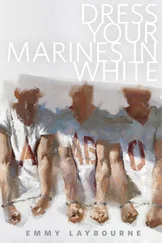The alarm sounded at three, and just as I was screwing up my courage, the claims adjuster stepped out of the bedroom, looking refreshed and ready to take on the afternoon. The following week he returned to work, and though I cleaned his apartment for another two years, we never saw each other again.
My boss was horrified by the suppository incident, but in retrospect I saw it as an adventure. It got sort of boring being alone all day, and so I asked to be sent on more jobs where the client was at home. Often these were one-shot deals. The apartment owner had hosted a particularly rowdy party or recently had some plaster sanded and wanted someone to straighten up the mess. Once I went to the home of a former Playmate who needed help reorganizing her closets. We got to talking, and she showed me pictures of her three ex-husbands, explaining that her family motto was "Eat, drink, and remarry."
"That's old," my boss said, but I had never heard it before.
In December of 1992 a story I'd written was broadcast on NPR, and six months later theNew York Times ran a little article headlinedHE DOES RADIOAND WINDOWS. It came out on a Sunday morning, and by tenA.M. people began calling me at home, asking if I could come clean their apartments. Many of them had an ulterior motive and wanted me to report on something they considered important or unfair: a discriminatory hiring practice, secret meetings held by their co-op board, a controversial medical breakthrough the bigwigs had chosen to suppress. "That's not really the kind of thing I do," I would tell them, but they were persistent and plied me with what they called "important contact numbers." This was always said in a whisper, implying that spies were everywhere.
When people phoned me at home I asked them to call my boss and set up an appointment through him. This proved my loyalty and weeded out some of the more obvious conspiracy theorists, who complained they were getting the runaround. A month after the article appeared, my boss left on vacation, and shortly afterward a stranger called, asking if I could possibly fit him in over the weekend. He gave me his name, Martin, and an address in the East Eighties. I offered to come at two o'clock on Sunday and after we'd hung up he called me again. "Is that twoA.M. or twoP.M.?" he asked.
"P.M.," I said. "Two in the afternoon."
I would later recognize this as the first sign of trouble.
The Upper East Side is dead on summer weekends, and walking north from the subway station, I passed no more than a dozen people. Martin lived on the fifteenth floor of a newly built tower. A security guard announced my arrival, and as I stepped off the elevator, a man opened his door and stuck his head into the hall. He looked to be in his mid-forties, plump, with a round, sunburned face and damp, wheat-colored hair that was fine, like a baby's. Sweat soaked the underarms of his T-shirt, which fit him snugly around the stomach and pictured a sailboat in rough, tightly stretched waters. "Are you the one I talked to on the phone?" he asked.
I said that I was, and looking slightly disappointed, as if people like me were somehow the story of his life, he patted me on the back and introduced himself.
I thought that Martin had just returned from some sort of exercise, but walking into the apartment, I understood that his sweat was home-brewed. Outside it was in the high eighties, but his living room was at least ten degrees hotter. "It's like a pizza oven," he said. This was not offered as an apology. If anything, he sounded boastful. I looked at the air conditioner lying unplugged in the middle of the floor, at the row of closed windows offering a view of the neighboring high-rise.
"If you're hot, you can always. ." He stuck his hands in the pockets of his shorts and looked down at his bare feet. "You can always. . you know."
I guessed he meant that I could leave, but that seemed silly, seeing as I was already there. "That's all right," I told him. "I don't have air-conditioning, either."
"Oh, Ihave it," he said. "I just don't use it."
"Right."
"It came with the building," he said.
"That's nice."
"Nice if you like air-conditioning."
"Which you don't," I said.
"No," he said. "Not at all."
Normally, after a minute or two of small talk, the client would direct me toward the vacuum cleaner and make himself scarce. Martin continued to stare at his feet, and it occurred to me that if I were ever going to get out of there, I needed to take the lead. "If it's okay with you, I normally start with the kitchen," I said.
"Whatever you want." He walked toward the adjacent room and leaned against the doorjamb as I entered. You could tell immediately that the guy didn't cook. The stove looked brand-new, and aside from a Mr. Coffee machine, the countertop was bare.
"I'm normally not here on the weekends," he confided. "Not in the summer anyway."
I searched beneath the sink for cleaning supplies. "Oh, yeah?"
"Friday comes and I'm on the first bus to Fire Island," he said. "You ever go there? To FIRE ISLAND?"
He saidFire Island as if it were a prearranged code, the watchwords signaling me to hand over the microfilm. I told him I'd never been, and he took a seat on the countertop. "How can you not have gone to FIRE ISLAND?" he asked. "I thoughteverybody went there."
"Everybody but me." I opened his refrigerator, which was empty except for a jug of Diet Coke and dozens of doll-size bottles filled with clear serum. If forced to guess, I'd have said they were for some sort of a mental disorder. He simply would not let go of the Fire Island business.
"I can give you some information if you like," he said, and before I could decline he reached into a drawer and handed me a brochure. The cover pictured a dozen muscular men frolicking aboard the deck of a pleasure craft. Each was shirtless, and several wore nothing but thongs. I understood that he wanted me to comment on them, but instead I pointed to a tiny figure, barely visible on the distant shore. "Is that a fisherman?" I asked.
"Well, it might be," Martin said. "But that's not really what FIRE ISLAND is about."
I handed the brochure back to him. "I'm too impatient to fish. Crabbing, though, I don't mind that. So, tell me, do you have any brothers and sisters?"
The change in topic seemed to throw him. "A sister. She lives in New Jersey. But on FIRE ISLAND, see, they have — "
"And what about your parents?"
"My father died a few years ago," he said. "But my mother's still around."
He didn't seem very eager to talk about it, and so I dug in, hoping he might go into the other room and leave me alone. "So who does your mother love more, you or your sister?"
"I don't know," he said. "What difference does it make?"
"Just curious. Do you ever take her out to Fire Island?"
"No."
"Well, okay then," I said.
Martin stuck the brochure back into the drawer and retreated to the living room, where he turned on the TV and flipped back and forth between channels. With him out of the way, I finished the kitchen in no time. Next came the bathroom and then the bedroom, which was airless and cluttered and felt even hotter than the rest of the apartment. The dresser was heaped with clothing and gay pornography, the alternating layers of shirts and magazines reminding me of science projects illustrating the earth's crust. I counted five blankets on the unmade bed and was trying to make sense of them when Martin walked in and took a seat on a folding chair. The conversation in the kitchen was behind him now, and he appeared eager to make a fresh start. "Look at you, so hard at work!"
"How can you sleep with five blankets?" I asked.
"Well," he said. "I have diabetes. I get cold."
I had never heard of this. "Do all diabetics feel cold in the summer?"
Читать дальше












